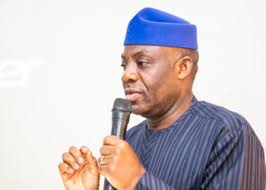FG unveils UBE school improvement programme
Programme
By Funmilayo Adeyemi
The Federal Government has launched the Universal Basic Education (UBE) School Based Management Committee-School Improvement Programme (SBMC-SIP) to boost teaching capacity, under the Teacher Professional Development (TPD).
Speaking at an event in Abuja on Monday, the Minister of Education, Dr Tunji Alausa, emphasized that the initiative would foster community partnership and engagement.
Alausa stated that the programme aimed to address the issue of out-of-school children and expand access to education for school-age children, while also improving the teaching and learning environment.
He mentioned that the activities would be funded through the Federal Government/UBE intervention fund and would guide further efforts to enhance the capacity of teachers across the country.
Alausa highlighted the importance of collaboration in advancing girl-child education and tackling the out-of-school syndrome.
“If girl-child education is to be advanced and if we are to eradicate or reduce the out-of-school syndrome, the government alone cannot tackle these challenges.
“It requires a synergy of efforts from all stakeholders, with the community playing a major role, to pave the way for achieving the expected outcomes,” he said.
He stressed that the government alone could not solve these challenges and that a synergy of efforts, particularly from communities, was essential for achieving the desired outcomes.
The minister also reaffirmed the Federal Government’s commitment to supporting the UBEC’s 2025-2027 initiatives, which include the construction of 7,200 new UBE facilities and the provision of 1,680,000 furniture pieces.
“Additionally, the initiatives involve the extensive renovation of 195,000 classrooms, as well as the installation of 22,900 water boreholes and 28,000 toilets across schools.”
These efforts, he said, were aimed at creating a safe learning environment, especially in rural areas.
Alausa outlined the pillars of the ministry’s education sector renewal initiative, which includes increasing enrollment, enhancing TVET to address skill gaps, advancing girl-child education, harnessing data and digitisation, and strengthening quality assurance to meet global standards.
He also explained that the teacher professional development programme aligned with the ministry’s goal of improving learning outcomes by strengthening teacher quality.
The Executive Secretary of UBEC, Aisha Garba, also addressed the progress made in Nigeria’s basic education sector, noting a seven per cent increase in school enrollment over the past two to three years.
However, she lamented that about 13 million children remained out of school, particularly in rural and low-income communities.
Garba reaffirmed the government’s commitment to delivering equitable, quality education for every Nigerian child.
“Imagine a child in a community eager to learn, full of promise, yet held back by a lack of infrastructure, qualified teachers, learning materials, and a conducive learning environment.
“Today, we mark a defining milestone in our shared vision to deliver equitable, quality-based education for every Nigerian child and to rewrite that story.
“We gather to reaffirm our commitment to every Nigerian child. We are unleashing the promise of a nation.
“The promise that every Nigerian child, no matter their circumstances or location, deserves a solid start to life through quality-based education,” she said. (NAN)(www.nannews.ng)
Edited by Abiemwense Moru





